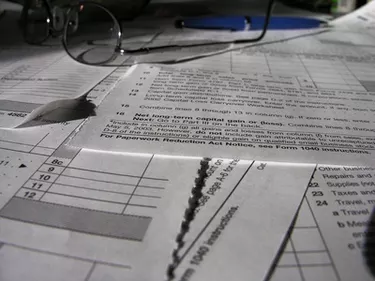
Normal trustee fiduciary fees paid to a trustee to administer a trust are deductible items for federal income tax purposes. Deductions claimed are either deductible items on the trust tax return, since the trust is a taxpayer, or passed through to the trust beneficiaries, depending on the entity type of the trust filing a return.
Standard Grantor Trust
Video of the Day
The Internal Revenue Code treats the grantor of a trust as the owner of the grantor trust for tax purposes. The grantor trust files a Form 1041 with the Internal Revenue Service that contains limited information, and is not as complex as other trust types. The Form 1041 creates a pass-through for income and deductions and has an attachment that shows all items taxable to the grantor. The trustee fees on the attachment show as a deductible item for the grantor, and the grantor will deduct the trustee fees paid on his personal income tax return Form 1040.
Video of the Day
Simple and Complex Trusts
Simple and complex trusts file an extensive Form 1041 with the Internal Revenue Service. Upon completion of the Form 1041, a Form K-1 generates that shows the information a trust beneficiary must report on his personal income tax return Form 1040. In this situation, the trust as a taxpayer claims the deduction for the trustee fees on line 12 of the tax Form 1041. Any portion of the trustee fees that may be attributable to a beneficiary share that receives Form K-1 are netted out prior to the issuance of the Form K-1. Trust beneficiaries cannot deduct additional trustee fees on their personal Form 1040, as they may only report the information contained on the Form K-1.
Split Interest Charitable Trusts
A split interest charitable trust either has current individual trust beneficiaries with the principal of the trust paid to charity at the end of the trust term, or has current charitable beneficiaries with the principal paid to individuals at the end of the trust term. These trusts file a Split Interest Trust Information Return, Internal Revenue Service Form 5227. Form 5227 is similar to Form 1041, in that the trustee fees are deductible to the trust on line 19 of the form. As with simple and complex trusts, the individual trust beneficiaries cannot deduct trustee fees on their individual personal income tax returns, and the deduction is applied at the trust tax return level.
State Returns and Professional Advice
Each state is unique regarding state taxes due, and some states require trust income tax returns and some do not. For states that do require trust income tax returns, each state has different requirements regarding deductible items claimed on a return, which includes deduction of trustee fees. If the trust has situs in a jurisdiction that requires filing a state tax return for trusts, consult a CPA or tax lawyer familiar with the tax laws of the state. It is also a good idea to consult with a professional CPA regarding any trust tax filings, as trust tax law changes frequently.